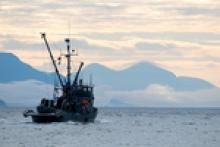I recently ran across a constellation of articles online about something I've been thinking about for a while now. Seafood is the only commercial food which is primarily wild caught. Can you imagine if the beef industry's attention were turned to wild buffalo, or to herds of elk or white tailed deer? They wouldn't last long out there, would they? And it would be completely unreasonable to expect the wilderness to sustain our appetite.
And yet, that's pretty much what we're doing with seafood. Commercial fisheries are collapsing left and right, and each time a domino falls, the effect is felt throughout the entire food chain. How long before the food chain in the oceans collapses completely?
As species like the Atlantic cod are overfished and the fisheries close, it focuses the commercial fishing industry's attention on fewer and fewer species. For example, McDonalds fish fillets used to be sourced from a number of different species, depending on the region and the time of year. Now they are made strictly with the meat of the hoki fish, a deep water fish off the coast of New Zealand. And surprise, the hoki fishery is being swiftly depleted.
Where will McDonald's turn next? What wild species will find its way into the fish fillet? Out of everything else on the menu, the Fishwich is the only thing which comes from the wild. As a sometimes-fish-eating vegetarian who relies on the Fishwich when I end up at McDonald's, I feel really bad about this personally. It's my demand for the Fishwich, along with everyone else's, which is wiping the seas clean of hoki fish.
The same can be said for every other species which is currently being fished. Only a few species are being farm raised. And farming fish causes ecological disasters of its own. Terrestrial fisheries like catfish and tilapia aren't too bad, as long as the fish waste is properly processed. But farmed shrimp ant Atlantic salmon create a huge problem for the ocean ecology.
Imagine if a cattle feed lot emptied its lagoon of manure into Yellowstone National Park. That's pretty much the situation here.
To make things worse, only 1% of the world's oceans are set aside as marine preserves. These act as safety zones, where species can quietly gather their strength and work towards strengthening their numbers. Only 1%! Greenpeace is calling for 20% of the world's oceans to be set aside, which I think is a sensible goal.
Even when a fish species itself isn't threatened directly, the actions taken to catch it can wreak havoc. Long lines can snag turtles and sharks, and trawlers scrape up everything living on the bottom and drag it to the surface. Net fishing kills everything it scoops up, and when the nets accidentally get free (as they often do) they result in "ghost nets" which drift loose through the ocean, bringing death wherever they go.
According to Greenpeace, if we don't back off our current pace of fish consumption, the world's oceans will be un-fish-able within 50 years. Food for thought, perhaps?
And yet, that's pretty much what we're doing with seafood. Commercial fisheries are collapsing left and right, and each time a domino falls, the effect is felt throughout the entire food chain. How long before the food chain in the oceans collapses completely?
As species like the Atlantic cod are overfished and the fisheries close, it focuses the commercial fishing industry's attention on fewer and fewer species. For example, McDonalds fish fillets used to be sourced from a number of different species, depending on the region and the time of year. Now they are made strictly with the meat of the hoki fish, a deep water fish off the coast of New Zealand. And surprise, the hoki fishery is being swiftly depleted.
Where will McDonald's turn next? What wild species will find its way into the fish fillet? Out of everything else on the menu, the Fishwich is the only thing which comes from the wild. As a sometimes-fish-eating vegetarian who relies on the Fishwich when I end up at McDonald's, I feel really bad about this personally. It's my demand for the Fishwich, along with everyone else's, which is wiping the seas clean of hoki fish.
The same can be said for every other species which is currently being fished. Only a few species are being farm raised. And farming fish causes ecological disasters of its own. Terrestrial fisheries like catfish and tilapia aren't too bad, as long as the fish waste is properly processed. But farmed shrimp ant Atlantic salmon create a huge problem for the ocean ecology.
Imagine if a cattle feed lot emptied its lagoon of manure into Yellowstone National Park. That's pretty much the situation here.
To make things worse, only 1% of the world's oceans are set aside as marine preserves. These act as safety zones, where species can quietly gather their strength and work towards strengthening their numbers. Only 1%! Greenpeace is calling for 20% of the world's oceans to be set aside, which I think is a sensible goal.
Even when a fish species itself isn't threatened directly, the actions taken to catch it can wreak havoc. Long lines can snag turtles and sharks, and trawlers scrape up everything living on the bottom and drag it to the surface. Net fishing kills everything it scoops up, and when the nets accidentally get free (as they often do) they result in "ghost nets" which drift loose through the ocean, bringing death wherever they go.
According to Greenpeace, if we don't back off our current pace of fish consumption, the world's oceans will be un-fish-able within 50 years. Food for thought, perhaps?
Creative Commons-licensed image courtesy of Flickr user winkyintheuk
